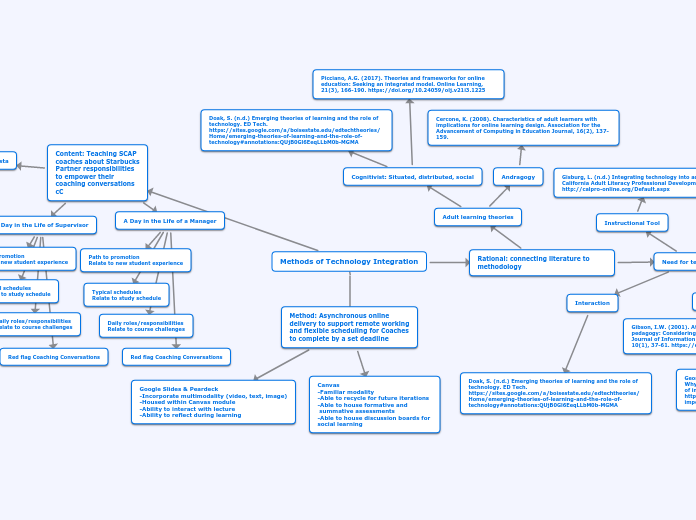Methods of Technology Integration
Content: Teaching SCAP
coaches about Starbucks
Partner responsibilities
to empower their
coaching conversations
cC
A Day in the Life of a Barista
Hiring/Onboarding
Relate to new student experience
Daily roles/responsibilities
Relate to course challenges
Typical schedules
Relate to study schedule
Red flag Coaching Conversations
A Day in the Life of Supervisor
Path to promotion
Relate to new student experience
Typical schedules
Relate to study schedule
Daily roles/responsibilities
Relate to course challenges
Red flag Coaching Conversations
A Day in the Life of a Manager
Path to promotion
Relate to new student experience
Typical schedules
Relate to study schedule
Daily roles/responsibilities
Relate to course challenges
Red flag Coaching Conversations
Method: Asynchronous online
delivery to support remote working
and flexible scheduling for Coaches
to complete by a set deadline
Google Slides & Peardeck
-Incorporate multimodality (video, text, image)
-Housed within Canvas module
-Ability to interact with lecture
-Ability to reflect during learning
Canvas
-Familiar modality
-Able to recycle for future iterations
-Able to house formative and
summative assessments
-Able to house discussion boards for
social learning
Rational: connecting literature to methodology
Need for technology
Interaction
Doak, S. (n.d.) Emerging theories of learning and the role of technology. ED Tech. https://sites.google.com/a/boisestate.edu/edtechtheories/Home/emerging-theories-of-learning-and-the-role-of-technology#annotations:QUjB0Gl6EeqLLbM0b-MGMA
Student-centric
Gibson, I.W. (2001). At the intersection of technology and pedagogy: Considering styles of learning and teaching. Journal of Information Technology for Teacher Education, 10(1), 37-61. https://doi.org/10.1080/14759390100200102
George Lucas Educational Foundation. (2007, November 5). Why do we need technology integration? The myriad benefits of integrating technology into the classroom. Edutopia. https://www.edutopia.org/technology-integration-guide-importance#annotations:W_NFbGl8Eeq9JftUOXcqBQ
Instructional Tool
Gisburg, L. (n.d.) Integrating technology into adult learning. California Adult Literacy Professional Development Project. http://calpro-online.org/Default.aspx
Adult learning theories
Cognitivist: Situated, distributed, social
Doak, S. (n.d.) Emerging theories of learning and the role of technology. ED Tech. https://sites.google.com/a/boisestate.edu/edtechtheories/Home/emerging-theories-of-learning-and-the-role-of-technology#annotations:QUjB0Gl6EeqLLbM0b-MGMA
Picciano, A.G. (2017). Theories and frameworks for online education: Seeking an integrated model. Online Learning, 21(3), 166-190. https://doi.org/10.24059/olj.v21i3.1225
Andragogy
Cercone, K. (2008). Characteristics of adult learners with implications for online learning design. Association for the Advancement of Computing in Education Journal, 16(2), 137-159.
